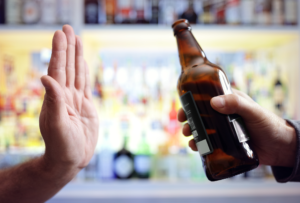 While you’re actively drinking or using drugs, it seems like everyone wants you to get clean and sober – family members, spouses or partners, the law, your boss, etc. But despite all this promotion of sobriety, does anyone ever really offer you an accurate and honest picture of what that might look like? Maybe, in your toughest moments, you might think “it’s got to be better than this,” but that’s not exactly the same as knowing what to expect.
While you’re actively drinking or using drugs, it seems like everyone wants you to get clean and sober – family members, spouses or partners, the law, your boss, etc. But despite all this promotion of sobriety, does anyone ever really offer you an accurate and honest picture of what that might look like? Maybe, in your toughest moments, you might think “it’s got to be better than this,” but that’s not exactly the same as knowing what to expect.
For many people who become addicted to drugs or alcohol, daily life becomes an odd combination of the simple and complex: priorities are simple – protect your ability to continue to drink or use drugs. But the mess that accumulates while you ignore important tasks in favor of getting drunk or high can be a complex mess of problems of every type – legal, work, family, social – you name it, it gets complicated.
For More Information About Our Addiction Treatment Programs
Call Us At: (310) 455-5258
Getting sober does mean life gets better – but it isn’t always easy. An honest look at some of the challenges you’re likely to face in early recovery may help you anticipate pitfalls and prevent triggers to relapse. That’s part of sobriety – anticipating challenges and then meeting them by preparing and planning ahead. For lots of people in early recovery, managing challenges and feeling a sense of accomplishment from taking care of things is one of the many great things about getting sober.
Here are five specific challenges you’re likely to face in early recovery:
Managing money. When you’re drinking or using drugs, managing money is all about managing access to alcohol or drugs. That’ the priority and being responsible about paying bills often ends up taking a back seat. But in early recovery, when you’re genuinely trying to change your ways, be more responsible, and take care of your obligations, managing your money can be a difficult challenge. Having money in your pocket, or your checking account, can be a trigger for relapse. Juggling bills and struggling to clean up a financial mess that addiction caused can also be a trigger for relapse. And family members or partners that put pressure on you to earn more or get a better job more quickly can be an additional stressor.
Intimacy. When you are drinking or using drugs, authentic emotional intimacy is often not possible. Using alcohol or drugs tends to impede intimacy, and while you might have physically intimate interactions, addiction tends to get in the way of real closeness and the vulnerability that come with it. However, in sobriety intimacy is a significant challenge. For many people, issues with intimacy go hand in hand with addiction – it was more comfortable to get drunk or high than to be fully present and vulnerable with another person. In early recovery, you can expect to feel the whole range of feelings about getting truly close to other people – everything from desire to confusion to dread.
Honesty. Lying is part and parcel of the disease of addiction and alcoholism. In early recovery, being rigorously honest is key – but not as simple as it sounds. There may be hard questions about the past that will come up with family members, or uncomfortable issues that arise at work. You’ll need to get comfortable being honest, and also dealing with the uncomfortable feelings that may arise from this honesty.
Boredom. When you are actively drinking or using drugs, you are always seeking the next opportunity to use. Often using includes other activities or behaviors when you’re under the influence – for some people this may include fighting, reckless driving, or sex. Even scoring drugs can be risky and “exciting.” For some people, the lifestyle that accompanies addiction involves a great deal of drama and adrenaline. It can be a culture shock to step away from that lifestyle and find new ways to have fun and enjoy yourself.
Expectations. Your spouse and your kids have been hoping you’d get clean for months or even years. Now, in early recovery, you may find that they had very specific expectations of you as a recovering person – expectations that you might not be able to live up to. Perhaps you have some expectations too – hopes and dreams about life getting better once you get clean and sober. Your own expectations can be very hard to live up to, as well.
Forewarned is forearmed. While you might not be able to avoid these challenges, rest assured they are something you share with many people who have gotten clean and made it through early recovery. For each of these challenges, the helpful tip is the same: communicate. Talk to your sponsor, your loved ones, your therapist, and your friends. Talk about how you feel, and listen to what others have to share as well. Practice being honest about your experience, and even more importantly, practice tolerating the discomfort that comes with early recovery. Learning to be OK, even when things are not OK, is one of the many keys to success in sobriety.



